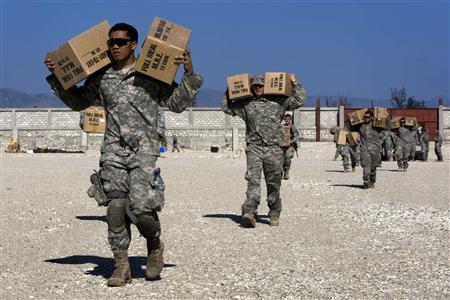PORT-AU-PRINCE, (Reuters) – U.S. Black Hawk helicopters landed American paratroopers at the wrecked presidential palace in the heart of earthquake-shattered Port-au-Prince today in a show of military force supporting a massive multinational relief operation.
It was one of the most visible and potentially sensitive deployments in Haiti so far by the U.S. military, which is spearheading international aid efforts to assist millions of Haitians left injured or homeless by the devastating earthquake a week ago.
In the grounds of the once-elegant but now caved-in presidential palace, some 20 Black Hawk helicopters, landing in relay, disgorged 82nd Airborne Division paratroopers in full combat gear. They then began unloading equipment, supplies, boxes of water bottles and food rations.
At least one Latin American leader, Venezuela’s socialist President Hugo Chavez, who is a fiery critic of what he calls U.S. “imperialism”, has already accused Washington of “occupying” Haiti under the pretext of an aid operation.
On several occasions in Haiti’s turbulent history, U.S. Marines have intervened in the Caribbean state — the poorest in the Western Hemisphere.
But U.S. commanders of the Haiti relief operation have been at pains to stress that their deployment is humanitarian and has the full backing of Haitian President Rene Preval, whose administration was crippled by the quake.
The U.S. airborne troops, their automatic rifles slung over their shoulders but with the barrels carefully pointed downwards to indicate no hostility, marched to Port-au-Prince’s nearby General Hospital, apparently with a mission to protect international medical teams who are racing against time to tend seriously injured quake victims.
Hundreds of Haitian earthquake survivors, who had been sheltering in an improvised makeshift camp near the presidential palace, rushed up to the iron railings in front of the building, peering through and awaiting aid handouts.
With comments of “Great!” and “Here they come!”, the crowd generally welcomed the arrival of the U.S. troops. Some called on the U.S. paratroopers to deal with looters and criminals who have been preying on wrecked neighborhoods since the quake.
Others screamed angrily. “Where’s the help, where’s the help? We have received nothing yet.”
But many seemed relieved to see the American troops.
“We do not know exactly what they have come to do but I think they are here to help us, so we tell them welcome,” one observer, Alex Michel, 40, told Reuters.
“We would not wish to see foreign military disembarking in our country but given the terrible situation we are in, their presence is necessary,” said Moline Augustin, also watching outside the palace.
More than 11,000 U.S. military personnel are on the ground in Haiti, on ships offshore or en route. This includes Marines and troops from the 82nd Airborne.
U.S. officers say that the Americans’ main mission is humanitarian, to participate in and help protect a huge international aid distribution operation for earthquake victims. But they add they will also be ready to boost security in Port-au-Prince if necessary.
Since the quake a week ago, looters and scavengers have swarmed over wrecked shops and businesses in downtown parts of the capital, carrying off what they can find and fighting among themselves. Some have been shot dead by Haitian police.
Port-au-Prince’s once elegant presidential palace was badly damaged in the Jan. 12 quake, which authorities estimate may have killed up to 200,000 people, and Haitian President Rene Preval has been running his government out of a police station near the airport.
U.S. choppers land troops in heart of Haiti capital






